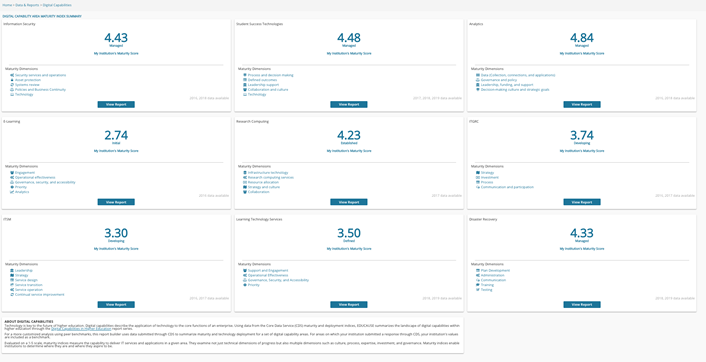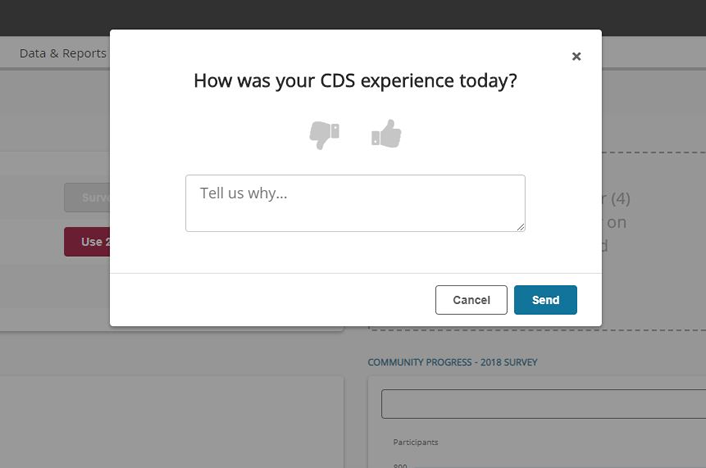The Core Data Service portal has undergone significant changes over the last year, including the addition of a Digital Capabilities dashboard, an in-portal feedback tool, and the implementation of more rigorous processes for monitoring key performance indicators.

Last year, EDUCAUSE announced significant changes to the Core Data Service (CDS) program, including a new CDS portal interface and more agile and responsive service development and operations. We concluded last year's announcement by expressing our hope that you, the EDUCAUSE member, would "continue to join us on this journey and help us make a meaningful difference in the higher education IT community."
Over the last year, several aspects of this statement have been borne out through our ongoing work with CDS: (1) the improvement and delivery of this vital service to the EDUCAUSE community is, indeed, a journey rather than a single, achievable point in time; (2) you, the EDUCAUSE member, have continued to help us in this work in ways too numerous and meaningful to fully measure or express; and (3) together we are making a difference, data point by data point and decision by decision, in the higher education IT community.
The Journey of Ongoing Service Improvement
The surrealist painter Salvador Dali once said, "Have no fear of perfection—you'll never reach it." While CDS may never be "perfect," we've remained steadfastly committed to learning, growing, and identifying ways to improve the service for end users and their institutions. Internally, we referred to last year's new portal interface as CDS 3.0, recognizing that it was only the first of many improved versions of the service that we'd be rolling out. Indeed, since launching CDS 3.0 last year, we've subsequently released at least 20 updated versions of the service. Each release has been packed either with important fixes to the service or with exciting new features to make the service better. We currently find ourselves at CDS version 3.5.1, with no end to the improvement cycle in sight, and we've even opened up our version release notes so that you can stay abreast of service changes as they are made.
Among the improvements we have made or are making in the months ahead:
- In April 2019, we released a new Digital Capabilities dashboard within the portal (see figure 1 below), enabling users to more easily benchmark their institution's maturity across a range of capability areas and create and download maturity data and reports.
- We're working on providing data literacy training so that users can learn how to get the most out of their data.
- We also envision developing a peer recommender system that will allow users to evaluate the appropriateness of their existing peer groups, while providing users with suggestions for new peers they might consider.
These are just several of the many steps we have taken and will be taking on the journey ahead, and, with any luck, we'll be looking back this time next year with excitement and appreciation for how far we've come.

With a Little Help from Our Friends
None of the work we've accomplished over the past year would have been possible without the help of our members—not by a long shot. The CDS service exists for and because of EDUCAUSE members and their institutions, and we want every nut and bolt of the service to be put in place with careful attention to the members' needs and experiences. To this end, we've incorporated a number of feedback mechanisms to put us in a better position to understand user experiences and needs with this service. We've conducted CDS user surveys focused on satisfaction, preferences, and behaviors. We've created an in-portal feedback tool that provides us with occasional thumbs-up or thumbs-down user feedback (see figure 2 below). We've also implemented more rigorous processes for monitoring key performance indicators (KPIs), allowing our staff and leadership to keep track of service metrics such as portal engagement, service ticket resolution, and service-disruption incidents.

We've also enlisted more in-depth, sustained help from smaller segments of our member communities, including member working groups, our Analytics Services Design Panel, and the Analytics & Research Advisory Group. These brave individuals are tormented regularly by our staff for the betterment of the larger EDUCAUSE community, providing just-in-time feedback on service improvements, guidance on longer-term strategic directions, and ad hoc feedback to our staff on how they're experiencing the CDS service in their day-to-day work. Through all of it—the surveys, the KPIs, and the tormenting—we've benefited immeasurably from the time and energy you, our members, have devoted to helping us. We believe the end result has been a stronger responsiveness to the experiences and needs of EDUCAUSE members and institutions.
Want to join the Analytics Services Design Panel and help us improve CDS? Email [email protected] to learn more and volunteer.
For the Common Good of Higher Education
Finally, all of this is for naught unless members and institutions are finding ways of putting CDS data to use, resulting in improved institutional decisions and practices. The CDS program exists to make a lasting difference in higher education by providing data that matter to IT professionals and their institutions. Our efforts to ensure that our data are valid and reliable, as well as our ongoing service improvements to make our data easier to access and use through the CDS portal, will help us achieve our vision of having a positive impact on higher education.
Over the years, our members have shared the creative ways in which they use CDS data to inform their planning. We're continuing to see evidence of successful use of even our newest data tools. For example, Chris Gill, Chief Information Technology Officer at Drake University, offered the following reaction to our new CDS digital capability dashboard tool:
In a single stroke, the CDS team has eliminated the need for what was a very manual and time-consuming benchmarking process. I'm already planning to use the information security capability dashboard to help provide context to our Board on the work we are doing to protect institutional systems and data.
CDS data are being used by Chris and other members to make a difference at their institutions, and we hope this use continues, and even ramps up, in the future. Of course, Chris's story is just one of many, and we know not everyone who participates in CDS can so readily apply their data to their institution's needs. As we turn our attention to data literacy, we will be reaching out to understand more about community-wide attitudes and practices around accessing and using our CDS data. We want every CDS user's story to feel like Chris's, but in instances where it doesn't, we want to understand why and determine what we can do to help CDS make a difference.
We invite you to join us on the CDS journey this year, whether you are a new or returning user. We care deeply about your success in using this resource, and we can't develop and deliver this resource without you. This year's CDS survey opens on July 15, and we hope you are as ready and excited about diving in and providing your institution's data as we are about receiving and leveraging the data to build new insights and services. There's a little bit of something for everyone in CDS. Make plans to get your institution started on July 15, and discover what CDS can offer!
For more information about the CDS survey and portal tool, and to learn how your institution can participate, visit the Core Data Service web page.
Mark McCormack is Senior Director of Analytics & Research at EDUCAUSE.
Leah Lang is Director of Analytics Services at EDUCAUSE.
© 2019 Mark McCormack and Leah Lang. The text of this work is licensed under a Creative Commons BY-NC-ND 4.0 International License.
